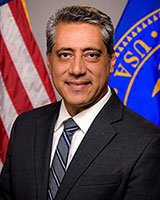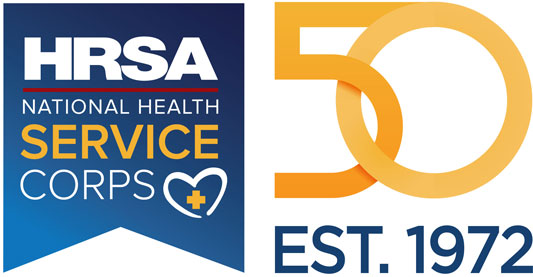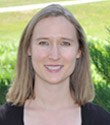Jun 29, 2022
National Health Service Corps 50th Anniversary: Q&A with Dr. Luis Padilla
by Allee Mead
 Dr. Luis
Padilla is the associate administrator for the Bureau of Health Workforce at
the Health Resources and Services Administration (HRSA)
and director of the National Health Service
Corps (NHSC). Padilla has been with HRSA since 2015.
Prior to HRSA, he was a National Health Service Corps
scholar, family physician, medical director, and senior
health policy advisor at a Federally Qualified Health
Center (FQHC) in Washington, D.C., for 12 years.
Dr. Luis
Padilla is the associate administrator for the Bureau of Health Workforce at
the Health Resources and Services Administration (HRSA)
and director of the National Health Service
Corps (NHSC). Padilla has been with HRSA since 2015.
Prior to HRSA, he was a National Health Service Corps
scholar, family physician, medical director, and senior
health policy advisor at a Federally Qualified Health
Center (FQHC) in Washington, D.C., for 12 years.
In this interview, Dr. Padilla discusses the 50th anniversary of the National Health Service Corps. Established in 1972, the NHSC provides loan repayment programs and scholarships for providers agreeing to serve in underserved communities.
What is significant about the NHSC's 50th anniversary?
I think it's just a tremendous milestone. Since the 1970s, the National Health Service Corps has been pivotal to meeting the needs of communities across the country. Since its inception, it's been focused on underserved rural and tribal communities, making sure that there are much-needed clinicians in those areas. And the program has grown and changed over the last 50 years. It's no longer just one program. We have six scholarship and loan repayment programs under the umbrella of the National Health Service Corps. But despite that variance of programs, they are committed to the same mission to meet community needs across the country. And it certainly has played an important role during the COVID-19 pandemic. Our National Health Service Corps participants have been there on the front line, whether they were nurses, physicians, physician assistants (PAs), nurse practitioners, behavioral health providers, or oral health providers. And they've been right there along with every other provider risking their lives. I just couldn't be happier to celebrate the 50th anniversary of the Corps and these dedicated providers.
What has been NHSC's impact on rural communities, both historically and recently?
This 50th anniversary and theme for the NHSC 50 — commitment, compassion, and community — really does reflect how National Health Service Corps members don't just serve, but they have a commitment to serve.
This 50th anniversary and theme for the NHSC 50 — commitment, compassion, and community — really does reflect how National Health Service Corps members don't just serve, but they have a commitment to serve. They have compassion for their patients and build those community connections right from the beginning where they serve, whether they're loan repayment clinicians or scholars. That commitment to community certainly has been evident in rural areas. We have just a little bit more than a third of our nearly 20,000 field strength working in rural areas across the country. Many of our clinicians often have some connection to where they serve in their background. They maybe come from disadvantaged backgrounds. They maybe come from communities of color. And certainly those who have a history of coming from rural America are part of the Corps and they go back and they provide services in those areas.
 The impact has
been significant over the 50 years of the NHSC, with its
launch in '72. One of our very first clinicians was Dr.
Joseph Viglotti, who served in rural Jackman, Maine. The
small hospital in Jackman was serving around 3,000
patients when Dr. Viglotti and his wife, a nurse,
arrived. Before the National Health Service Corps placed
Dr. Viglotti in Jackman, three doctors had set up
practice in the previous four years, and each had left
that town shortly after arriving. With Viglotti's arrival
and a two-year service commitment, the town was assured
that there was a doctor who would remain there for that
period of time. So from the very beginning, the NHSC has
made an impact in rural communities across the country.
And it continues to do so now.
The impact has
been significant over the 50 years of the NHSC, with its
launch in '72. One of our very first clinicians was Dr.
Joseph Viglotti, who served in rural Jackman, Maine. The
small hospital in Jackman was serving around 3,000
patients when Dr. Viglotti and his wife, a nurse,
arrived. Before the National Health Service Corps placed
Dr. Viglotti in Jackman, three doctors had set up
practice in the previous four years, and each had left
that town shortly after arriving. With Viglotti's arrival
and a two-year service commitment, the town was assured
that there was a doctor who would remain there for that
period of time. So from the very beginning, the NHSC has
made an impact in rural communities across the country.
And it continues to do so now.
How does the presence of NHSC providers impact the communities they serve?
I think the immediate thing is that it's getting much-needed clinical staff there, whether it's physicians, nurses, or PAs. All the disciplines that are covered through the program have opportunities to serve in rural areas. Certainly, that presence is important. Previous studies have shown that the presence of clinicians in rural areas, including those in National Health Service Corps, have an economic impact in those communities. These professionals draw services to that area: they need schools, they need certain amenities. And certainly having physicians there, having nurses there, that professional cadre of providers and other health professionals that we support through the program, draw in those much-needed services and provide an economic boost to those areas.
I think it's the economic factors that the Corps has been able to impact in rural communities, along with addressing the provider shortages of those communities. And obviously having a clinician there where there hasn't been one before is tremendously impactful. Even now we have rural communities that really rely on our clinicians. They may be the only ones providing services for hundreds of miles. That certainly is the case in Alaska. And some of our clinicians there have practiced and provided both family medicine and obstetric services. So the impact is pretty significant when you look at the needs in rural communities and what the National Health Service Corps has been able to do to address some of those needs.
What other BHW initiatives serving rural communities would you like to highlight?
 While the
National Health Service Corps is certainly the focus
right now with the 50th anniversary, it's not the only
program in the Bureau that addresses rural health needs.
We have over 40 programs that we leverage to support
communities, not just in rural areas, but all underserved
areas. I want to mention the Rural
Residency Planning and Development Program, which
helps residents train and go on to practice. This
program, which BHW jointly administers with the Federal
Office of Rural Health Policy, is intended to develop
those residency programs to put them on a path to getting
established and accredited and then becoming sustainable
and providing services in those rural areas through that
pipeline of physicians. We also have nursing programs: a
Nurse
Practitioner Residency Program that prepares new
practitioners and nurse midwives to work in primary care,
not solely focused on a rural setting, but the program
gives preference to projects that benefit rural
populations. Forty percent of those training sites were
in rural areas in the last academic year.
While the
National Health Service Corps is certainly the focus
right now with the 50th anniversary, it's not the only
program in the Bureau that addresses rural health needs.
We have over 40 programs that we leverage to support
communities, not just in rural areas, but all underserved
areas. I want to mention the Rural
Residency Planning and Development Program, which
helps residents train and go on to practice. This
program, which BHW jointly administers with the Federal
Office of Rural Health Policy, is intended to develop
those residency programs to put them on a path to getting
established and accredited and then becoming sustainable
and providing services in those rural areas through that
pipeline of physicians. We also have nursing programs: a
Nurse
Practitioner Residency Program that prepares new
practitioners and nurse midwives to work in primary care,
not solely focused on a rural setting, but the program
gives preference to projects that benefit rural
populations. Forty percent of those training sites were
in rural areas in the last academic year.
The Teaching Health Center Graduate Medical Education program supports community-based ambulatory residency programs, and a good portion of those are in rural communities. Certainly right now with COVID-19 and all the behavioral health needs across the country, including youth behavioral health needs, our Behavioral Health Workforce Education and Training (BHWET) program emphasizes community-based training. It's expanding use of paraprofessionals and integrating behavioral health into primary care. And while it doesn't have a particular focus in rural, it does train providers in behavioral health and substance use disorder services to provide to rural, underserved communities. As a result of those training programs, we're training behavioral health providers, many of whom will then be eligible for National Health Service Corps loan repayment, if they haven't already taken advantage of our scholarship program.
Are there any future NHSC plans you can share?
The one I want to more specifically talk about is our Maternal Care Target Areas (MCTAs). We are excited that that initiative is kicking off. We will be fully implementing that in early 2023, as we launch our new National Health Service Corps Loan Repayment Program application cycle. We've designated Maternal Care Target Areas in existing primary care shortage areas that will help recruit and retain maternal health providers, like OB-GYNs and certified nurse midwives. So we'll be identifying those areas of the country in need of those maternal health providers, then providing National Health Service Corps loan repayment awards based on those targeted areas.
The future is bright for the National Health Service Corps. Once we are done celebrating the 50th anniversary, it's essentially back to work supporting our nearly 20,000 members who continue to implement the mission that they've had for 50 years: serving rural and underserved communities and responding to public health emergencies.
The future is bright for the National Health Service Corps. Once we are done celebrating the 50th anniversary, it's essentially back to work supporting our nearly 20,000 members who continue to implement the mission that they've had for 50 years: serving rural and underserved communities and responding to public health emergencies. Through COVID, Zika, the opioid crisis, and other emergencies that have occurred, the National Health Service Corps clinicians have been present and will continue to be present during such times.
Is there anything else you would like to share?
This is such a significant year for the National Health Service Corps. Thousands of clinicians have served across the country, more than 66,000 alumni through the program. They've been helping to combat the COVID-19 pandemic by administering tests and vaccines, helping care for individuals and their families who have been infected by COVID-19, and even now serving those who are suffering any long-term consequences of the infection. As the Corps continues to grow, HRSA is increasingly focused on those emerging needs, not just this pandemic but others, and now really intently focused on mental health and substance use disorder. With COVID and everything that it's brought to bear, our behavioral health needs are pressing, and the Corps is going to be there continuing to support people through our behavioral health clinicians and through our primary care clinicians who provide mental and behavioral health as well.
I just want to emphasize again how committed the agency continues to be in its goal of building healthy communities, assuring that we're addressing adequate health equity, and reducing health disparities. We're just thrilled that the National Health Service Corps is celebrating this anniversary in conjunction with all the other programs that we leverage through the agency in terms of workforce, whether it's primary care, oral health, behavioral health, or women's health.
I would just encourage everyone who has served in the National Health Service Corps, current or alumni, or who appreciates the service and dedication of the Corps to join us in celebrating this anniversary and pass the word along that they can visit the NHSC 50th anniversary website (no longer available online) for more information and ways to connect and engage with us.
To learn more about the NHSC, you can like NHSC on Facebook, follow NHSC on LinkedIn, follow @NHSCorps on Twitter, and sign up for NHSC email updates.
Opinions expressed are those of the interviewee and do not necessarily reflect the views of the Rural Health Information Hub.

